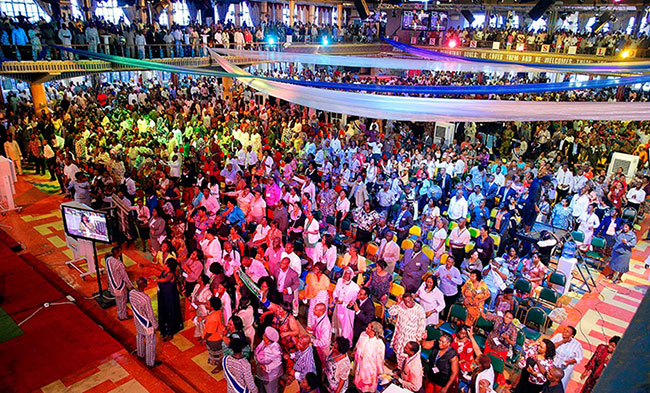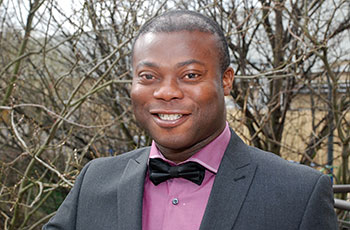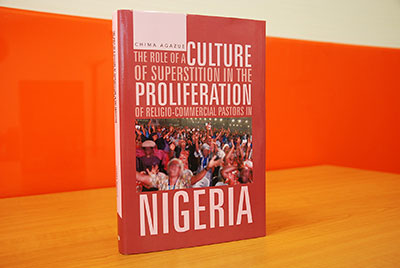Superstition, witchcraft and fake pastors who prey on Nigerians

Tue, 31 Mar 2015 17:00:00 BST
Nigerian researcher Chima Agazue investigates the growing number of corrupt Men of God who prey on the poor for money
SUPERSTITION – including a belief in evil spirits and witchcraft – is causing countless poor Nigerians to fund the lavish lifestyles of crooked pastors. Meanwhile, they risk their health by spurning conventional medical treatment and they endanger their lives on the country’s dangerous roads, in the belief that they have divine protection.
 These are among the findings of Nigerian researcher Chima Agazue (pictured right) based at the University of Huddersfield who has written a sequence of books that probe the role of religion and superstition in his home country. He is also in the closing stages of a PhD that uses the scientific discipline of forensic and criminal psychology to examine the consequences of a burgeoning belief in witchcraft.
These are among the findings of Nigerian researcher Chima Agazue (pictured right) based at the University of Huddersfield who has written a sequence of books that probe the role of religion and superstition in his home country. He is also in the closing stages of a PhD that uses the scientific discipline of forensic and criminal psychology to examine the consequences of a burgeoning belief in witchcraft.
Chima Agazue’s latest book investigates how the culture of superstition in Africa’s most populous country has led to a proliferation of what he describes as “religio-commercial pastors”. They describe themselves as Pentecostalists because that sect is less regulated than Anglicanism and Catholicism.
Rise of the unrighteous
 Chima – who has studied for a succession of degrees at the University of Huddersfield – carried out extensive field research in Nigeria and witnessed the extraordinary rise in the number of self-proclaimed pastors and their chapels.
Chima – who has studied for a succession of degrees at the University of Huddersfield – carried out extensive field research in Nigeria and witnessed the extraordinary rise in the number of self-proclaimed pastors and their chapels.
“When I was growing up in the 80s and 90s, we had few Pentecostal churches, and they were well-regulated. But now they are everywhere. I drove roughly two miles on one street and counted 17 churches. There was one compound that had six competing Pentecostal churches and a single two-storey building with six churches.”
Congregations are told that problems such as ill-health or lack of prosperity are due to witchcraft or ancestral spirits – requiring costly exorcism. They are also deterred from seeking conventional medical treatment. The pastors themselves display conspicuous wealth and do so as a marketing strategy because it allegedly proves their efficacy. Adherents are persuaded to sell belongings and donate the proceeds to their pastor, encouraged to believe that they are “sowing seeds” that will cause them to become wealthy themselves.
“They are told that when you give to God, he multiplies your wealth,” said Chima, who has uncovered many abuses, ranging from pastors congregating outside university lecture theatres, claiming that they can secure good marks for students; to motorists who persist in using ill-maintained, unsafe vehicles, in the belief that their pastor has procured them immunity from danger.
 Systematic exploitation
Systematic exploitation
In the preface to the new book, Chima vividly describes how he collected data in “a country where religion seems to permeate almost every aspect of society”.
“It has become the norm in Nigeria for anyone turning on a radio or television to be greeted by pastors marketing God with testimonies of unverifiable miracles and marketplaces are filled with the religion of noisy preachers with megaphones. Buses and coaches are boarded by mobile pastors claiming that, without their intervention, blood-sucking demons will cause road accidents and attract armed robbers to the travellers. Exorcisms are then conducted and the passengers are expected to pay for these religio-commercial services.”
Chima concludes that “in conjunction with the systematic exploitation of culturally-embedded superstitious beliefs, the true message of Christianity is being perverted by these pastors and it is time for the Nigerian government to find a way of regulating their pervasive activities”.
Witchcraft and women
Chima Agazue moved to the UK for university study in 2005 and was intent on combining the subjects of psychology and criminology. He discovered that Huddersfield offered the combination of courses that he needed and has obtained a BSc (Hons) in Psychology with Criminology and an MSc by Research in the Psychology of Religion. The material he gathered for this was the basis for his latest book.
He is now in the concluding phase of doctoral research, supervised by the psychologist Dr Helen Gavin, who is Director of Graduate Education for the School of Human and Health Sciences. The latest project continues Chima’s detailed investigation of violent crimes induced by religion and superstition with a particular focus on women, and is entitled Criminogenic Implications of Witchcraft Superstition in Contemporary Africa: A Connection with Female Pattern of Aggression and Homicide. He is analysing a deeply troubling combination of religion and cultural tradition.
“There is an upsurge in the belief that children can be possessed by the witchcraft spirits and mothers are actually pressured into abandoning, torturing or killing them because of this.”
- The latest book by Chima Agazue is entitled The Role of a Culture of Superstition in the Proliferation of Religio-Commercial Pastors in Nigeria.







